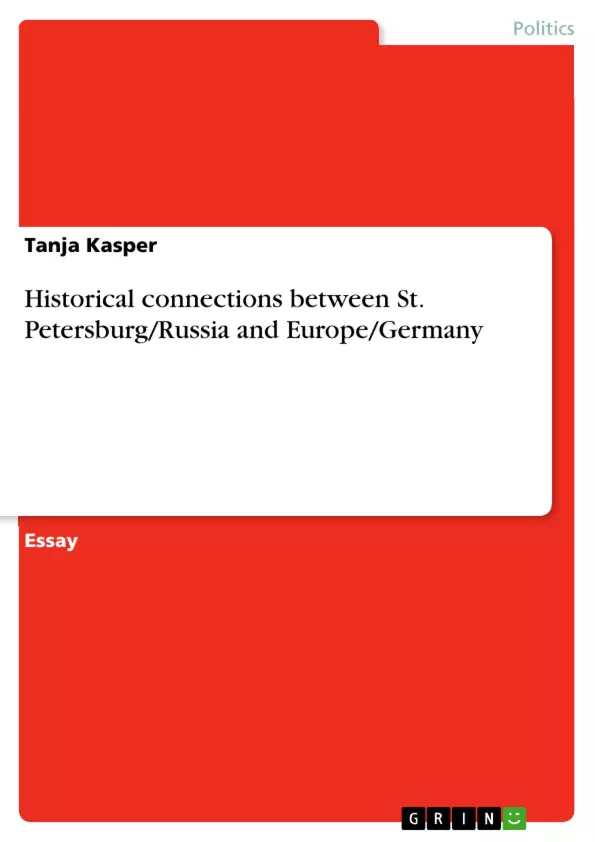“St. Petersburg – Russian’s window to Europe”
you can read in almost every information about the city. But besides being the biggest city in western Russia and an important access to the Baltic sea it has also some important ‘personal’ relations to Europe or e.g. Germany: Peter I the Great and Vladimir Putin.
One, the famous founder of St. Petersburg in 1703, who moved the capital from Moscow to his new preferred location and thereby opened whole Russia to deeper relations to the West. The second one, the current Russian president who aims to lead his country with his immense power more and more to become one of the big global players in other/more aspects than in former times. So both have close biographical relationships to Europe or European countries and through their power as heads of the country, this in turn has been influencing Russian culture, politics and business. On the basis of these St.Petersburg characters I would like to identify some hints for a ‘Westernization’ of Russia (through St.Petersburg) in Detail.
But simultaneously important separating factors shall be mentioned which causes still more reluctant behaviour from companies towards Russia. After all I have to add something crucial about the resources I used. It was surprisingly for me to discover that there are only sparely reliable information about Russian topics in the internet available.
So I had to reduce my sources mainly to Wikipedia and my St.Petersburg Travel guide Vis-à-Vis2.3 I tried at least to re-check the information in e.g. comparing the articles of Wikipedia between different languages and other links I found. But still there is perhaps a lack of the scientifically demanded variance and acceptance of used sources.
Inhaltsverzeichnis (Table of Contents)
- Introduction
- Main Part
- Peter the Great
- Vladimir Putin
- Differences
- Summary
Zielsetzung und Themenschwerpunkte (Objectives and Key Themes)
This essay aims to analyze the historical connections between St. Petersburg and Europe, focusing on the influence of prominent Russian figures, Peter the Great and Vladimir Putin. It explores how these historical figures, through their interactions with European nations, have shaped Russia's culture, politics, and business landscape.
- The impact of Peter the Great on Russia's Westernization
- Vladimir Putin's role in Russia's global ambitions
- Key differences between Russia and Europe
- The influence of European culture on St. Petersburg
- Challenges and opportunities for Western businesses in Russia
Zusammenfassung der Kapitel (Chapter Summaries)
The introduction provides an overview of St. Petersburg's historical connections with Europe, focusing on the figures of Peter the Great and Vladimir Putin. It sets the stage for exploring the impact of these figures on Russia's Westernization.
The main part delves into the historical and political significance of Peter the Great. It explores his European travels, his influence on Russian culture, and his role in establishing St. Petersburg as a "window to Europe."
The essay further analyzes the contemporary relevance of Vladimir Putin's leadership. It examines his strategic vision for Russia's global ambitions, the challenges of westernization in the current political climate, and the role of St. Petersburg in this context.
The essay concludes by outlining key differences between Russia and Europe. It analyzes the factors that contribute to a "reluctant behaviour" from companies towards Russia, highlighting the challenges of cultural and political complexities.
Schlüsselwörter (Keywords)
This essay focuses on the historical and contemporary connections between St. Petersburg and Europe. It examines key figures such as Peter the Great and Vladimir Putin, analyzing their impact on Russia's Westernization, cultural influence, and global ambitions. The essay also explores the challenges and opportunities for Western businesses in Russia, highlighting the cultural, political, and economic complexities of this relationship.
Frequently Asked Questions
Why is St. Petersburg called Russia's 'window to Europe'?
Because Peter the Great founded it in 1703 to open Russia to Western culture, trade, and political influence by moving the capital closer to the Baltic Sea.
What was Peter the Great's influence on Westernization?
He traveled through Europe and implemented Western administrative, military, and cultural standards in Russia, using St. Petersburg as the primary hub for these changes.
How is Vladimir Putin connected to St. Petersburg's European legacy?
Putin, born in St. Petersburg, has a biographical connection to Europe (having lived in Germany) and aims to position Russia as a major global player, often balancing Western influence with national power.
What are the main differences between Russia and Europe discussed?
The essay mentions cultural and political complexities that still cause reluctant behavior from Western companies towards the Russian market.
Why was the capital moved from Moscow to St. Petersburg?
To break away from old traditions and establish a new, modernized center that was geographically and culturally closer to European nations.
- Quote paper
- Tanja Kasper (Author), 2006, Historical connections between St. Petersburg/Russia and Europe/Germany, Munich, GRIN Verlag, https://www.grin.com/document/58860



